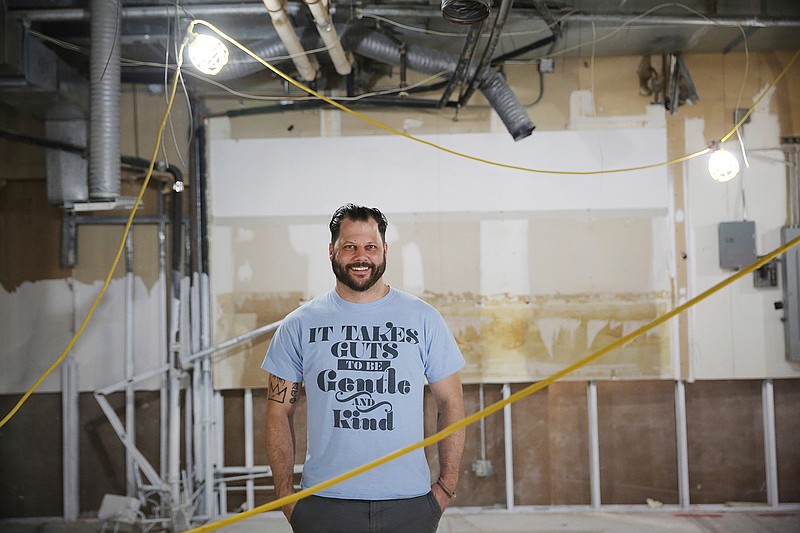DALLAS-You'll find it in an abandoned stretch of downtown Dallas' maze of tunnels underneath Thanks-Giving Square.
There's no sign pointing toward it. You have to know where to go or have Chad Houser as your guide.
The Dallas Morning News reports it's in this forgotten space-vacated long ago by a Lone Star Credit Union and one of those anything-goes restaurants serving everything from ham sandwiches to Chinese spring rolls-that Houser has targeted for the next phase of Cafe Momentum.
The downtown restaurant and nonprofit, where Houser is founder, CEO and executive chef, gives at-risk youth jobs while teaching them culinary skills. Since opening in 2015, Cafe Momentum has worked with more than 300 young men and women, of whom 85 percent have not reoffended during the critical first year, according to data from the organization.
This fall, Houser plans to dish out a lot more from Cafe Momentum's community services center. The space, now under construction, will bring in additional resources for youth outside the restaurant.
"Having a job is important, and it solves a lot. But it doesn't solve everything," Houser said. "It doesn't solve trauma. It doesn't solve undiagnosed health care. It doesn't solve education. It doesn't solve all of these things. We're diligently working to achieve that."
He cups his hands around his eyes and peers through the glass, past the old credit union's hours, still stuck on the wall.
Right now, it's just a shell of a space with concrete floors and exposed ceilings. But Houser-a self-proclaimed optimist-sees a lot more.
He talks of a classroom where interns will be taught academics before their shifts, a private therapy room, a space for snacks, a room stocked with emergency clothing and hygiene products, a wellness room for yoga and
staff offices.
"Momentum is a good word for it," Houser said, riffing off the program's name to describe the ongoing progress.
The center has been a few years coming. In 2015, Houser asked a team of graduate students at Southern Methodist University's Master of Arts in Design and Innovation program to help develop a stable housing situation for the interns-about two-thirds of whom are homeless.
But instead of a housing option, the graduate students suggested a community services center that would serve as a home base for the interns and expand the program's "hours of influence"-and theoretically its impact-through other programs outside of the restaurant.
Using an approach called "human-centered design," the grad students worked to understand the struggles the interns faced and what it's like to work at Cafe Momentum, said Kate Canales, former director of the design and innovation program at SMU's engineering school.
The SMU team spent time in the restaurant, washed dishes, set tables and slowly built trust with the interns, said Canales, who recently joined the Department of Design at the University of Texas at Austin. They learned that interns needed more than a place to rest at night-they needed more waking hours under the Cafe Momentum system.
"Some of them did need a place to sleep. That was true," Canales said. "But the more immediate problem was this thing they came to call 'hours of influence.'"
About a year ago, Houser sent Canales a text with a picture of an architectural firm's rendering of the community services center concept the graduate students had developed.
"I just started crying. I thought, 'Oh my gosh, it's real. It's going to come to life,'" Canales said. "It's what every design student hopes for."
Cafe Momentum signed the lease to rent the space from the city in January. Negotiations had lagged for a couple years as city leaders have been unsure what to do with the disconnected and somewhat abandoned underground tunnels.
The pedestrian network of passages and sky bridges-designed in the 1960s with a vision to bring a world of food and dining underground-is controversial. Critics have said the tunnels rob sidewalks of their traffic and downtown of its vibrancy.
The space Houser has under construction sat dormant for more than a decade. He discovered it while scouting spaces for the restaurant, nixing the idea of an underground restaurant for a place above on Pacific Avenue.
"I wasn't trying to create a retail space to drive people down here," Houser said of the community center. "This is a private space for my kids."
Already, about $190,000 has been raised for the estimated $450,000 project through donations of materials, money and grants. Details such as who will teach interns in the center's classroom and where the rest of the money will come from are being sorted out.
Houser pointed out that more than three years ago he opened a restaurant staffed primarily with juvenile offenders against the advice of skeptics.
"I'm a dreamer, but it's almost like the sky's the limit," he said.

